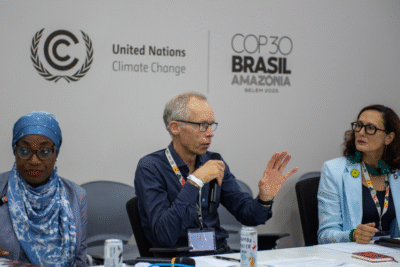Justice and Wellbeing within Planetary Boundaries: Key Insights from COP30 Side Event
20/11/2025
At COP30 in Belém, Brazil, Earth system experts from around the world convened on November 15 for the Official Side Event: ‘Justice and Wellbeing within Planetary Boundaries: Pathways for COP30’, hosted by Earth4All, Earth Commission and Global Commons Alliance.
Speakers explored the Earth Commission’s Safe and Just Space framework, and Earth4All System Dynamics Modeling, emphasizing the need for integrated systems-based approaches to address climate and nature risks that amplify global instability, as well as how to equip policymakers to navigate security challenges, build resilient alliances, and accelerate transformational, science-based action that safeguards both people and the planet.
Systems Thinking
Co-chair Sandrine Dixson-Declève, Executive Chair of Earth4All, opened with a stark warning on the nature and climate crises: “We’re obviously at one of the most fundamental moments, where we’re marking the 10 year anniversary of the Paris Agreement. We have surpassed 7 out of the 9 planetary boundaries. We’re in a very grave place, not only in terms of the science and the tipping points from an environmental perspective, but we have to also think about the social tipping points that are confronting us.”
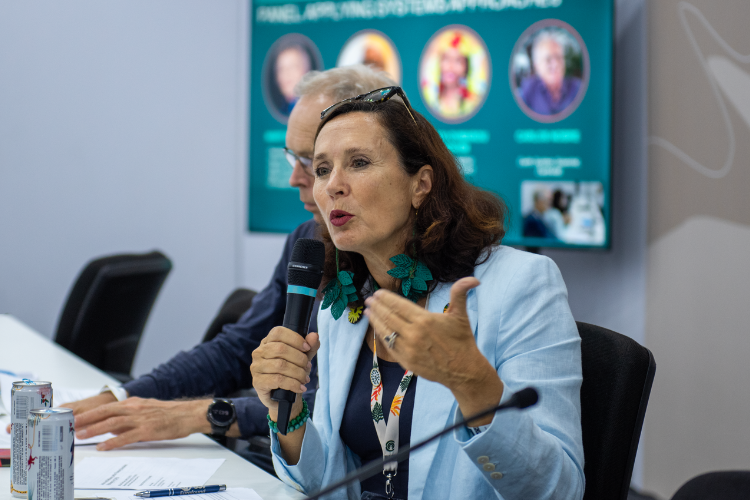
While introducing a presentation from Nathalie Spittler, Senior Scientist, BOKU University and Science Lead, Earth4All, Sandrine Dixson-Declève outlined the importance of organisations like Earth4All, Earth Commission and Global Commons Alliance collaborating on urgent science and social justice, while facing the extra challenges of turbulent geopolitics dismissing crucial Earth system science.
“We come together as a community concerned about planetary boundaries, but anchored in the understanding that if we’re truly going to have a framework of justice, we have to find compelling evidence, and also a compelling narrative, at a time when we know geopolitics are complex. We open this session with a call for caution, that as we take for granted ourselves that data and science is fundamental, we need to remember that data and science is under attack in many parts of the world. We need to bring forward that importance of data and science in everything we do, including in policy recommendations.”
She emphasized the disconnect between government narratives and public perception, referencing compelling evidence from G20 citizen surveys showing that a majority of citizens see environmental tipping points as influencing their daily lives, while also fundamentally supporting the need for a different economic model.
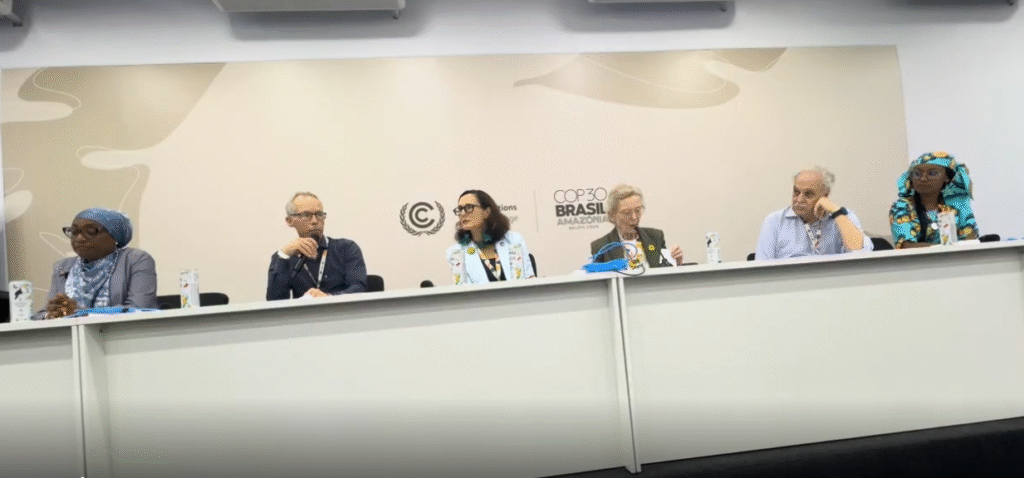
Scientific Evidence
Co-chair Johan Rockström, Director of PIK – Potsdam Institute for Climate Impact Research and Co-Chair of the Earth Commission, also highlighted how the Earth Commission quantifying the Safe and Just boundaries and Earth4All’s systems dynamics modelling and pathways helps measure success or failure against critical thresholds along with other scientific frameworks, in order to act with the urgency required within a fast-changing geopolitical context.
He warned: “Geopolitical instabilities are impacting and spilling over into our ability to align the transformations we know are necessary and the gap between the science and ability of the political actors of the world, to come close to what is needed.
“Even if the world implements all the commitments that are on the table, we would potentially at best reduce global emissions by 5% over the coming 10 years. [..] [And yet the science also] shows that from now on we need do indeed need to decrease by 5%, but not over 10 years – over each year, to have a chance of limiting overshoot which we are heading towards, and be able to come to a manageable future within the next 50-60 years.
“This is the dire truth of the urgency of our planetary crisis as we meet here in Belém.”
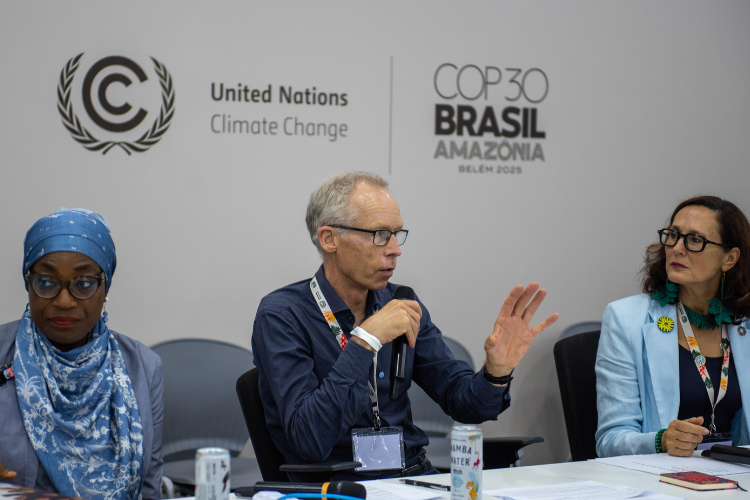
Multiple Dimensions of Injustice
Mary Robinson, Planetary Guardian, Founding member of The Elders and Adjunct Professor for Climate Justice in Trinity College Dublin; former President of Ireland and former UN High Commissioner for Human Rights, and co-founder, expressed strong support for both Earth4All’s systems dynamics approach and the Earth Commission’s Safe and Just boundaries framework. Reflecting on her experience as both President and UN High Commissioner for Human Rights, she noted how siloed her work had been, with climate not properly integrated into human rights considerations.
She identified multiple dimensions of injustice beyond just impacts on nature:
- climate and nature shocks disproportionately affecting the poorest countries
- small island states, and Indigenous peoples
- gender injustice as women are more severely affected due to different social roles and limited access to power
- intergenerational injustice harming young people
- the injustice of different development pathways, where industrialized economies built on fossil fuels now require just and equitable transitions.
Mary Robinson stated: “We have failed. We are failing still, the young people. There is such an injustice to those who have a future so much before them. [..] We must be serious about a just and equitable transition out of fossil fuels. The faster we can do it, the better for current and future generations.” She also recognized that the Rio Conventions in 1992 “was an extraordinary moment”, as the three conventions provided us with a way forward, but that now we must move “beyond these silos”.
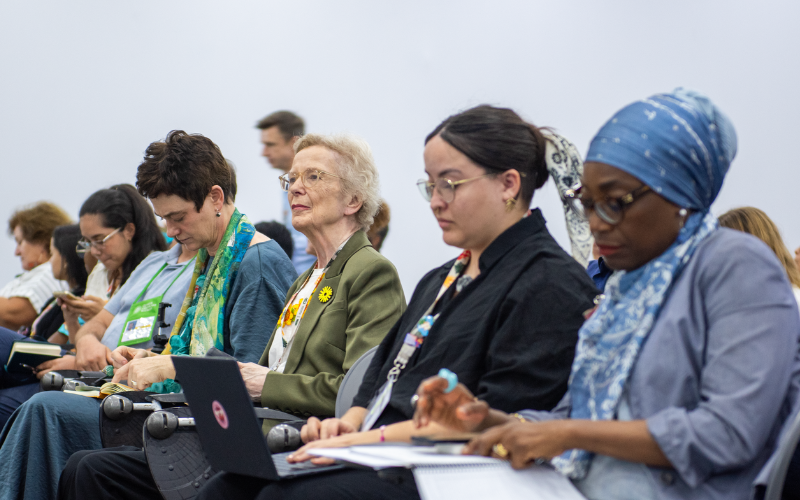
Indigenous and Regional Knowledge
Hindou Oumarou Ibrahim, Member of the United Nations Permanent Forum on Indigenous Issues, and President AFPAT, issued a rallying call for including Indigenous peoples as solutions to the crises. She celebrated the first Planetary Science Pavilion at COP30 and emphasized how ancient Indigenous knowledge, when combined with science, can accelerate effective solutions. She called Indigenous people “the doers” while politicians are in stasis, calling for a shift from demanding more data to implementation, and emphasizing the need for actual financing rather than mere promises – especially for youth and women who are thinking most locally. “We cannot move as silos, we must move collectively and holistically.”
Carlos Nobre, Earth System Scientist, University of São Paulo’s Institute for Advanced Studies, and Chair, Earth4All Brazil Transformative Economics and Planetary Boundaries Commission, highlighted the importance of Amazon connectivity for a living planet, noting that the rainforest generates 50% of its own rainfall. He discussed ongoing projects demonstrating how science can work with Indigenous knowledge and announced efforts to create an Amazon Institute of Knowledge with six innovation hubs across South America.
Fatima Denton, Director of the African Climate Policy Centre and Co-chair of the Earth Commission, proposed a hybrid decentralized governance model for climate economy, emphasizing that multilateralism alone is insufficient. She stressed the need for African countries to be recognized not just as suppliers of goods but as leaders. While European systems have existing energy infrastructure requiring retrofitting in the just energy transition, Africa must build energy infrastructure “from ground zero”, creating opportunities for collective movement and leveraging.
